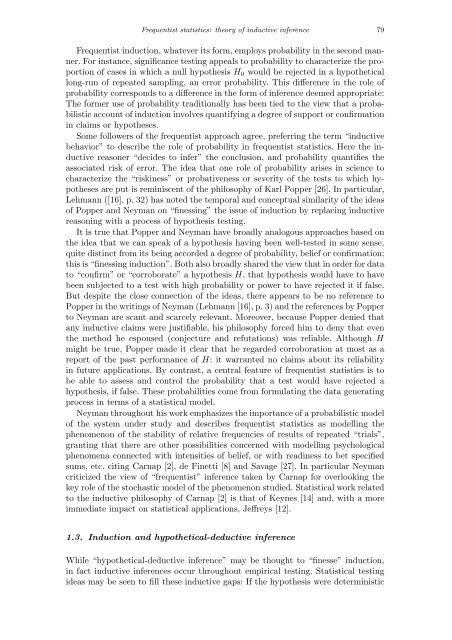Optimality
Optimality
Optimality
You also want an ePaper? Increase the reach of your titles
YUMPU automatically turns print PDFs into web optimized ePapers that Google loves.
Frequentist statistics: theory of inductive inference 79<br />
Frequentist induction, whatever its form, employs probability in the second manner.<br />
For instance, significance testing appeals to probability to characterize the proportion<br />
of cases in which a null hypothesis H0 would be rejected in a hypothetical<br />
long-run of repeated sampling, an error probability. This difference in the role of<br />
probability corresponds to a difference in the form of inference deemed appropriate:<br />
The former use of probability traditionally has been tied to the view that a probabilistic<br />
account of induction involves quantifying a degree of support or confirmation<br />
in claims or hypotheses.<br />
Some followers of the frequentist approach agree, preferring the term “inductive<br />
behavior” to describe the role of probability in frequentist statistics. Here the inductive<br />
reasoner “decides to infer” the conclusion, and probability quantifies the<br />
associated risk of error. The idea that one role of probability arises in science to<br />
characterize the “riskiness” or probativeness or severity of the tests to which hypotheses<br />
are put is reminiscent of the philosophy of Karl Popper [26]. In particular,<br />
Lehmann ([16], p. 32) has noted the temporal and conceptual similarity of the ideas<br />
of Popper and Neyman on “finessing” the issue of induction by replacing inductive<br />
reasoning with a process of hypothesis testing.<br />
It is true that Popper and Neyman have broadly analogous approaches based on<br />
the idea that we can speak of a hypothesis having been well-tested in some sense,<br />
quite distinct from its being accorded a degree of probability, belief or confirmation;<br />
this is “finessing induction”. Both also broadly shared the view that in order for data<br />
to “confirm” or “corroborate” a hypothesis H, that hypothesis would have to have<br />
been subjected to a test with high probability or power to have rejected it if false.<br />
But despite the close connection of the ideas, there appears to be no reference to<br />
Popper in the writings of Neyman (Lehmann [16], p. 3) and the references by Popper<br />
to Neyman are scant and scarcely relevant. Moreover, because Popper denied that<br />
any inductive claims were justifiable, his philosophy forced him to deny that even<br />
the method he espoused (conjecture and refutations) was reliable. Although H<br />
might be true, Popper made it clear that he regarded corroboration at most as a<br />
report of the past performance of H: it warranted no claims about its reliability<br />
in future applications. By contrast, a central feature of frequentist statistics is to<br />
be able to assess and control the probability that a test would have rejected a<br />
hypothesis, if false. These probabilities come from formulating the data generating<br />
process in terms of a statistical model.<br />
Neyman throughout his work emphasizes the importance of a probabilistic model<br />
of the system under study and describes frequentist statistics as modelling the<br />
phenomenon of the stability of relative frequencies of results of repeated “trials”,<br />
granting that there are other possibilities concerned with modelling psychological<br />
phenomena connected with intensities of belief, or with readiness to bet specified<br />
sums, etc. citing Carnap [2], de Finetti [8] and Savage [27]. In particular Neyman<br />
criticized the view of “frequentist” inference taken by Carnap for overlooking the<br />
key role of the stochastic model of the phenomenon studied. Statistical work related<br />
to the inductive philosophy of Carnap [2] is that of Keynes [14] and, with a more<br />
immediate impact on statistical applications, Jeffreys [12].<br />
1.3. Induction and hypothetical-deductive inference<br />
While “hypothetical-deductive inference” may be thought to “finesse” induction,<br />
in fact inductive inferences occur throughout empirical testing. Statistical testing<br />
ideas may be seen to fill these inductive gaps: If the hypothesis were deterministic
















